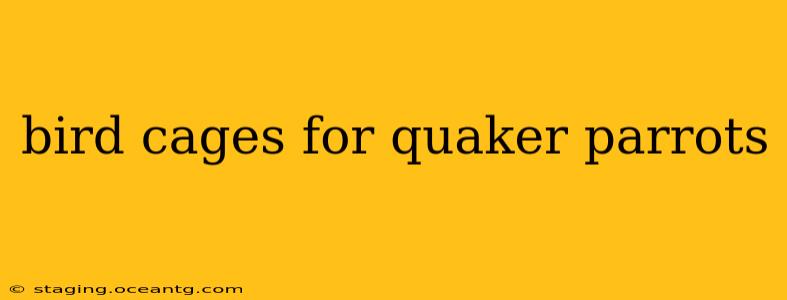Quaker parrots, also known as Monk parakeets, are intelligent, playful, and social birds that require a spacious and stimulating environment to thrive. Choosing the right cage is crucial for their physical and mental well-being. This guide will help you select the perfect bird cage for your Quaker parrot, addressing common concerns and providing expert advice.
What Size Bird Cage Do Quaker Parrots Need?
The minimum recommended cage size for a single Quaker parrot is significantly larger than many commercially available "parrot cages." Aim for a cage that's at least 36 inches tall, 24 inches wide, and 24 inches deep. Larger is always better! Remember, these are active birds that need ample space to climb, fly (within the confines of the cage), and play. A cramped cage can lead to stress, feather plucking, and other behavioral problems. If you plan on having multiple Quaker parrots, you'll need a substantially larger cage – consider doubling the dimensions for two birds.
What Type of Bird Cage is Best for Quaker Parrots?
While various cage types exist, some are better suited for Quaker parrots than others. Look for cages made from strong, durable materials like powder-coated steel or stainless steel. Avoid cages with lead-based paint or finishes, which are toxic to birds. The bars should be closely spaced (no more than ½ inch apart) to prevent escapes and to ensure the bird cannot get its head or beak stuck. A horizontal bar design is often preferred as it facilitates natural climbing behaviors.
What Features Should I Look for in a Quaker Parrot Cage?
Several features enhance a cage's suitability for Quaker parrots:
- Multiple Perches: Provide various sizes and shapes of perches to encourage natural foot and claw exercise. Avoid using sandpaper perches, as they can damage their feet.
- Spacious Feeding and Water Dishes: Easy access to food and water is essential. Consider placing dishes in different locations within the cage to enrich the bird's environment.
- Toys and Enrichment Items: Quaker parrots are highly intelligent and need mental stimulation. A variety of toys, including foraging toys, chew toys, and bells, will keep them entertained and prevent boredom.
- Easy Cleaning: Choose a cage with easily removable trays and grates for simple cleaning. Regular cleaning is crucial for maintaining a hygienic environment and preventing disease.
- Sturdy Construction: The cage needs to be robust enough to withstand the parrot's chewing and climbing. Look for quality construction and reliable locking mechanisms.
Are Flight Cages Necessary for Quaker Parrots?
While not strictly necessary, a large flight cage offers significant benefits. These spacious enclosures allow your Quaker parrot to stretch its wings and engage in more natural behaviors. A flight cage is particularly beneficial if you are unable to provide ample out-of-cage playtime.
How Do I Choose Between a Bird Cage and an Aviary?
An aviary offers the ultimate in space and environmental enrichment. However, aviaries require more space, often need to be custom-built or significantly more expensive, and may present more challenges in cleaning and maintenance. A very large, high-quality cage may be a more practical choice for most owners.
What are the Best Materials for Quaker Parrot Cages?
Powder-coated steel is a common and popular choice due to its durability and affordability. Stainless steel is more expensive but offers superior rust resistance and longevity. Avoid cages made from materials like plastic or untreated wood, as these can be easily damaged by a Quaker parrot's powerful beak and claws.
How Much Does a Suitable Bird Cage for a Quaker Parrot Cost?
The cost of a suitable cage varies greatly depending on size, materials, and features. Expect to spend anywhere from several hundred to over a thousand dollars for a high-quality cage that meets the needs of a Quaker parrot.
Remember, choosing the right cage is an investment in your Quaker parrot's health and happiness. By carefully considering the size, materials, and features discussed here, you can create a safe, stimulating, and enriching environment for your feathered friend.
